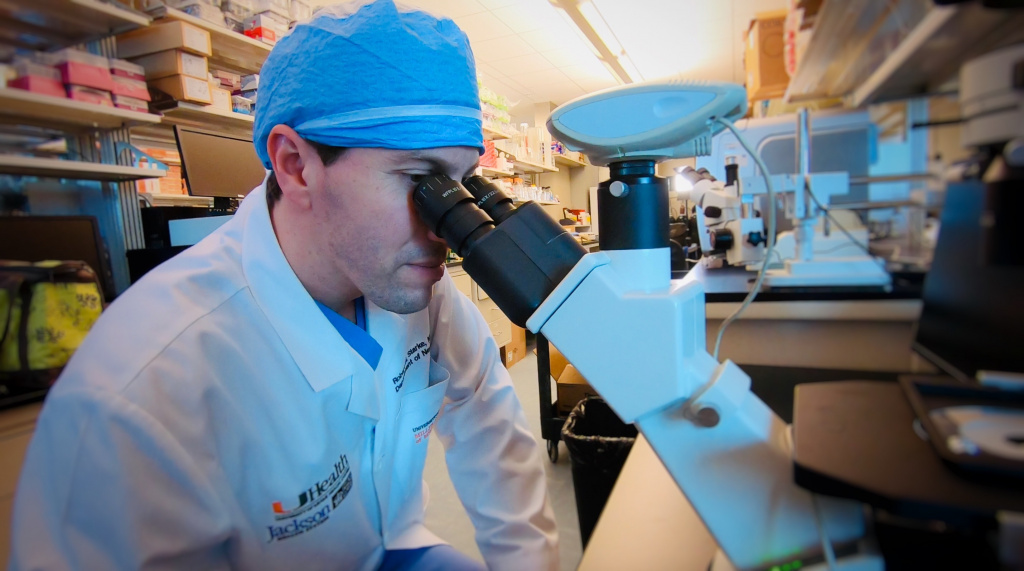Advancing the Treatment of Brain Aneurysms

A cerebral aneurysm is a thin spot in an artery of the brain that bulges out and fills with blood. It can happen to anyone at any age. Though some aneurysms remain very small, dormant, and harmless, these arterial weak spots can grow and put pressure on brain tissue and nerves, leak blood onto the brain, or rupture completely (brain hemorrhage). A ruptured aneurysm can cause serious health problems, including stroke, brain damage, coma, and even death.
Who’s at risk for a brain aneurysm?
According to the U.S. National Institutes of Health (NIH), approximately 30,000 people suffer a brain aneurysm rupture in the U.S. every year. They are most common in adults ages 30 to 60 and more prevalent in women than men.
What can increase your risk for developing an aneurysm?
Behavioral risk factors:
- high blood pressure, diabetes, or high cholesterol left untreated
- smoking
- drug abuse that raises blood pressure (e.g., cocaine, amphetamines)
Genetic risk factors:
- first-degree family member (child, sibling, or parent) with an aneurysm
- inherited connective tissue disorders that weaken artery walls
- polycystic kidney disease
- arteriovenous malformation(AVM)
Less common risk factors:
- head trauma
- brain tumor
- arterial wall infection
How are brain aneurysms treated?
Modern technology enables neurosurgeons to treat damaged brain vessels without open-skull surgery. Minimally invasive endovascular/cerebrovascular surgeries and craniotomies lead to better outcomes and shorter recovery times.
Sylvester Comprehensive Cancer Center and the University of Miami Health System uses 3D computer modeling to assist in the treatment of difficult and rare aneurysms. A dye is injected into arteries to track blood flow. A computer superimposes that information over brain scans to compose a 3D model of the aneurysm and the blood flowing through the arteries to the aneurysm. By using this technique, our neurosurgeons can test if different techniques would alter blood flow enough to ease pressure inside the aneurysm.
The future of treatment
Research continues to advance our understanding of cerebral aneurysms. The NIH recently awarded a $3 million grant to Dr. Robert M. Starke, a neurosurgeon at UM’s Miller School of Medicine and the University of Miami health System, to study prevention methods and novel treatments. Each year, Dr. Starke treats more than 600 patients for aneurysms.
“Our laboratory will be taking a close look at the cellular and genetic factors that lead to life-threatening aneurysms,” Dr. Starke said. “One of the goals of our research is to come up with a medical treatment to address inflammation and prevent aneurysm progression or rupture. … An increased understanding of the basic biology is critically necessary to developing new interventions to improve outcomes of cerebral aneurysm patients.”
With the new grant, Dr. Starke will study an innovative stent he helped develop. “This provides the backbone for a novel stent that can promote the growth of endothelial cells, reduce inflammation, and improve vascular healing,” he said.
The grant also supports the development of new imaging devices to identify unstable aneurysms so they can be treated before they rupture. “We will use a laser-imaging system inside an endovascular catheter and look at the cells on the inside of the blood vessel to see if they change over time,” he said.
Dr. Starke and the research team also aim to develop a blood test or genetic screening tool to identify patients at high risk for aneurysms in the future. “Drawing on cellular samples from patients undergoing treatment here, we are studying several potential medications for aneurysms, some of which can be delivered through endovascular stents or coils,” he said. “That’s one of the ways our extensive clinical practice supports our research into these life-threatening disorders.”
Adapted for UMiami Health News by Dana Kantrowitz. Originally written for Inventum.
Tags: aneurysm treatment, cerebral aneurysms, cerebrovascular surgeries, Dr. Robert M. Starke, neurosurgery
